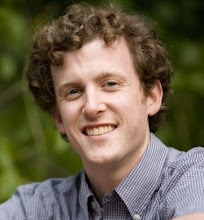Went on my first hospital visit today, tagging along with one of the associate pastors. The visit went well. At the end, the pastor asked the church member if he would like to pray, and then asked him "What do you need?" He was hoping for a discharge today, and needed the anesthesiologist to come by to do something in order for that to happen. So we circled, held hands, and prayed for the anesthesiologist to come and take care of him soon.
Having spent almost no time in hospitals in my life, I don't have much of an idea of what it is people want from their pastor when they're not well. But that prayer in the hospital room made me wonder something else: should we be praying for God to deliver on immediate, specific requests in this way? The bottom line is that I don't have the same faith in intercessory prayer that I used to. Where I used to lay prayers before God, now I feel like I want to understand first why this is a Christian practice.
A couple different thoughts come to mind for me. One is something I heard Tony Campolo say not too long ago. He was poking light at the prayers we say. Paraphrasing: "We'll pray, 'Oh, Lord, please be with Mary this week, as she has had chest pains and has to have double bypass surgery.' As if God is sitting up in Heaven and jumps up out of his chair -- 'You're kidding! I should get on that. Which hospital is she in?'" That resonates with me. I can't decide what I think I am doing by praying for a particular person. God already knows. On the other hand, Thomas Merton said somewhere (probably in The Seven Storey Mountain) that it is a special kind of arrogance to think your concerns don't warrant fervent prayer to God: this is another way of saying, "We've got things under control down here, thank you very much."
Today was the first day I realized that my desire for theological integrity and intentionality is manifesting itself as skepticism of some fundamental, revered practices. In other words, while I was trying distill these questions on prayer this afternoon, the anesthesiologist made his/her way up to the sixth floor and enabled our friend to go home.
Subscribe to:
Post Comments (Atom)

4 comments:
Hey, read this book review by Lauren Winner - http://www.christianitytoday.com/bc/2007/001/2.8.html
I like this part: "Prayer is not only about our asking God to intervene in our lives; it is also, and perhaps more essentially, about our entering into and aligning ourselves with the work that God is already doing in his creation."
Prayer ultimately has more to do with us being conformed to the will of God than, say, God granting our wishes. As Stanley Hauerwas says, every Christian prayer must end with, "and Thy will be done."
This is a great post.
I have taken some time to ponder the thoughts of this post and although I may not be as articulate as the writer, I believe in my heart that God expects and wants us to share with Him that which we discern we need. He is, after all, the One who ultimately knows our needs!
I have to believe that when I kneel at the throne of God and confess my needs to Him, I do so with the assurance that God knows my thoughts even before I utter them. It is in the act of asking that I am assured of His response.
I think of a few well-known Scriptural references: "ask and it shall be given", "knock and it shall be opened", "seek and ye shall find", "where 2 or 3 are gathered" to name just the obvious, and I know from my own prayer life that in asking I have received; maybe not the anesthesiologist so I could go home when I wanted to, but in the experience of seeing what God had in mind as I was delayed. Those moments are the most life-changing.
I appreciate the comments. The alarming thing for me is to realize that I may have less trust in God than I used to. At the same time, I don't think asking the questions is bad, per se; it's just where I am right now. The good news is that being committed to the church means I can trust the church's practices; I can keep praying, even while I try to figure things out.
Post a Comment